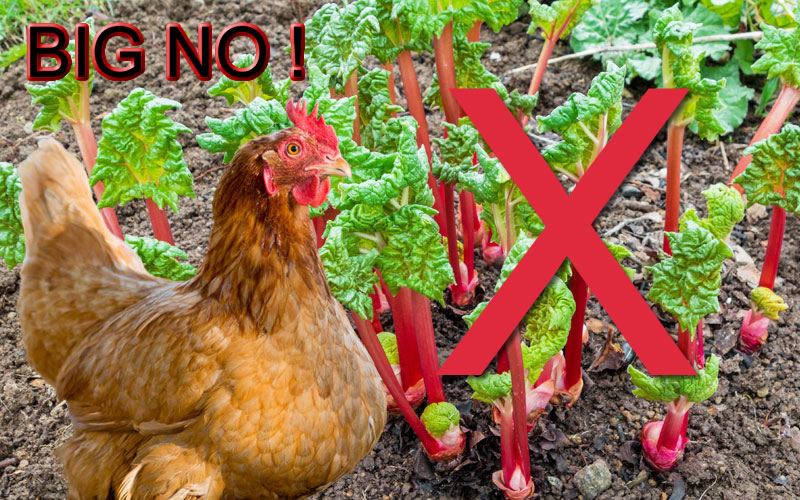Chickens are known for their curious and omnivorous nature, often pecking at a variety of foods in their environment. However, not everything they find is safe for them to eat. One common garden plant that raises questions is rhubarb. If you’ve been wondering whether rhubarb is safe for your chickens, this guide will provide you with all the information you need to know about feeding rhubarb to chickens.
Can Chickens Eat Rhubarb?

Why Rhubarb is Toxic to Chickens
Rhubarb, particularly the leaves, contains high levels of oxalic acid and anthraquinones. These compounds are toxic to chickens and can lead to a range of health problems:
- Oxalic Acid: This substance can bind with calcium in the body, forming insoluble calcium oxalate crystals. These crystals can cause kidney damage and failure in chickens.
- Anthraquinones: These compounds can act as laxatives and cause severe digestive distress, including diarrhea and abdominal pain.
Symptoms of Rhubarb Poisoning in Chickens
If a chicken ingests rhubarb, it may exhibit symptoms of poisoning. These symptoms can vary depending on the amount consumed but typically include:
- Diarrhea: Excessive droppings and watery stool are common signs.
- Lethargy: Chickens may become weak and inactive.
- Loss of Appetite: Affected chickens may stop eating.
- Drooling: Excessive saliva production is another possible symptom.
- Abdominal Pain: Chickens may show signs of discomfort or pain.
What to Do If Your Chicken Eats Rhubarb
If you suspect that your chicken has ingested rhubarb, it’s important to act quickly:
- Remove Access: Immediately remove any remaining rhubarb to prevent further ingestion.
- Observe: Monitor your chicken closely for any signs of poisoning.
- Contact a Vet: Seek veterinary assistance as soon as possible. The vet may administer treatments to mitigate the effects of the toxins and provide supportive care.
Safe Alternatives to Rhubarb for Chickens
There are many safe and nutritious treats that you can offer your chickens instead of rhubarb. Some good options include:
- Leafy Greens: Lettuce, spinach, and kale are excellent choices.
- Vegetables: Carrots, peas, and cucumbers are safe and nutritious.
- Fruits: Apples (without seeds), berries, and melons are great treats.
Preventing Access to Toxic Plants
To keep your chickens safe, it’s important to prevent them from accessing toxic plants like rhubarb. Here are some tips:
- Secure Your Garden: Use fencing or barriers to keep chickens out of areas where rhubarb and other toxic plants are grown.
- Educate Yourself: Familiarize yourself with common garden plants that are toxic to chickens.
- Supervise Free-Range Time: When allowing chickens to free-range, supervise them to ensure they don’t peck at harmful plants.
How Rhubarb Can Affect Chicken Eggs
Feeding rhubarb to chickens can also have an impact on egg production and quality. The toxins in rhubarb can cause a decrease in egg production and may lead to eggs with poor shell quality. Ensuring that your chickens have a safe and balanced diet is crucial for maintaining healthy egg production.
Bottom Line
Chickens should not eat rhubarb due to its toxic properties. Rhubarb contains oxalic acid and anthraquinones, which can cause serious health issues in chickens, including kidney damage and digestive problems. It is important to provide your chickens with safe and nutritious alternatives and to prevent them from accessing toxic plants.
FAQ
Can chickens eat cooked rhubarb?
No, cooking rhubarb does not eliminate the toxins. Cooked rhubarb is still harmful to chickens and should be avoided.
Are there any parts of the rhubarb plant that are safe for chickens?
No, all parts of the rhubarb plant, including the stalks and leaves, contain toxic compounds that are harmful to chickens.
What other common plants are toxic to chickens?
Other common plants toxic to chickens include avocado, green potatoes, tomato leaves, and certain types of beans. Always research and ensure the safety of any plant before allowing your chickens to consume it.

